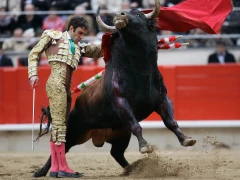bullfight [ˈbulfait] n. 斗牛
drunk [drʌŋk] n. 醉汉
wander [ˈwɔndə] v. 溜达,乱走
* * *
A: Is the whole building his?
B: Yes, he told us that we could wander around at will.
A:这整栋建筑都是他的?
B:是的,他告诉我们说我们可以任意闲逛。
* * *
ring [riŋ] n. 圆形竞技场地
unaware [ˌʌnəˈweə] adj. 不知道的,未察觉的
bull [bul] n. 公牛
matador [ˈmætədɔː] n. 斗牛士
* * *
A: The matador is so handsome.
B: His performance is nice, too.
A:那位斗牛士真帅。
B:他的表演也很精彩。
* * *
remark [riˈmɑːk] n. 评论,言语
apparently [əˈpærəntli] adv. 明显地
【扩】markedly 明显地 noticeably 明显地,显著地
* * *
A: Some of the figures are apparently not accurate.
B: Why do you say so?
A:这些数字有一些明显是不准确的。
B:你为什么这么说?
* * *
sensitive [ˈsensitiv] adj. 敏感的
【派】sensitiveness 神经过敏
【搭】be sensitive to 对……敏感
* * *
A: Susan was very angry at being teased.
B: She is too sensitive.
A:苏珊遭到取笑后很生气。
B:她太敏感了。
* * *
criticism [ˈkritisizəm] n. 批评
charge [tʃɑːdʒ] v. 冲上去
clumsily [ˈklʌmzili] adv. 笨拙地
【扩】woodenly 笨拙地 ungracefully 笨拙地
【反】deftly 灵巧地
* * *
A: The young man drew out a pile of bills and searched clumsily among them for some change.
B: What does he want to do?
A:小伙子手忙脚乱地拿出一大把钞票并在其中寻找零钱。
B:他想干什么?
* * *
bow [bau] v. 鞠躬
safety [ˈseifti] n. 安全地带
sympathetically [ˌsimpəˈθetikli] adv. 同情地
* * *
A: He is looking at her sympathetically.
B: Did he know her experience?
A:他同情地望着她。
B:他知道她的经历了?
noun [专属名词]斗牛(流行于西班牙和南美) - Many of Hemingway's heroses love bullfight.
adjective [原级]喝醉的,醉酒的;陶醉的,沉醉的,忘乎所以 - I got drunk and had to be carried home.
noun [专属名词]酗酒者,酒鬼;<非正式>纵饮,醉酒 - A drunk is someone who is drunk or frequently gets drunk.
verb [vt. 及物动词]喝,饮;喝酒(drink 的过去分词形式) - He gets aggressive when he's drunk.
verb [vt. 及物动词]漫游,游荡,漫步,流浪;走神,开小差;偏离,走偏(道路、航线等);(目光)游移,往别处看;(河流、道路等)蜿蜒曲折;离题;(因年老而)神志恍惚,精神错乱;在人的身上摸来摸去(尤指他人不情愿时);(对固定的性伴侣)不忠 - When he got bored he wandered around the fair.
noun [专属名词]游荡,漫步 - A wander around any market will reveal stalls piled high with vegetables.
noun [具体名词]戒指,指环;环状物;钟声;按铃,敲钟;电话铃声 - After at least eight rings, an ancient-sounding maid answered the phone.
verb [vt. 及物动词]包围,围住;把......圈起来;使成环形;发出钟声,响起铃声 - Would you ring me as soon as you find out? My number's in the phone book.
vt. (这种响是刺耳的, 往往是提醒人做某事)
- Every morning the clock rings at 6.
- The telephone(door bell) is ringing.
vt. 打电话给(美语中用 call) ring sb. 给某人打电话
- Tomorrow I'll ring you.
n. (打)电话
- give sb. a ring
- Remember to give me a ring. /Remember to ring me.
n. 戒指
adjective [原级]不知道的,未察觉到的,未意识到的 - Many people are unaware of just how much food and drink they consume.
adverb [方式副词]意外地,不知不觉地 - She was sublimely unaware of the trouble she had caused.
be unaware of …
- The drunk was unaware of the danger.
aware adj. 觉察到的,意识到的
be aware of …
noun [专属名词]公牛;雄性大型动物;买空者,多头;教皇诏书,教皇训谕;<非正式>废话,胡说八道;靶心 - He was gored by a bull.
verb [vi. 不及物动词]<非正式>用力推,猛推;(母牛)发情 - to raise or attempt to raise the price or prices of (a stock market or a security) by speculative buying (
noun [专属名词]斗牛士;王牌 - "I was inspired by the films of Pedro Almodóvar " said Mr. Williamson, although he did show a bright blue matador jacket and narrow pants.
noun [抽象名词]言论,评述;(正式演讲时的)言论(remarks);<正式> 引人注目,显耀 - If you make a remark about something, you say something about it.
verb [vi. 不及物动词]谈论,说起;注意到 - I remarked that I would go shopping that afternoon.
remark 主要指说, 当 say 来理解 remark 与 observe 都可以表示“说,评论说”,它们比 say 要正式
- ‘You’re looking very well!’She remarked/observed.
notice 和 observe 都可以表示“注意到,察觉到”,但有一定区别。notice 指无意中“察觉到”;observe 则可以指有意观察、仔细地看,比 notice 更正式:
- He observed me carefully. (He looked at me.) 他仔细地看着我.
- Did you notice how she was dressed? 你注意到她的穿戴了吗?
- I’ve noticed/observed that he telephones her oftener than before. 我发现/注意到他现在给她打电话比以前次数多了。
- I didn’t notice his leaving.
make rude remark / call one's name / say F words (F 指 fuck) 讲粗话,骂人
- He made a lot of rude remarks about the hat she was wearing.
fail to do sth. 没有能够
not fail to 表示强烈地肯定
- I had changed the furniture round that you can not fail to notict it.我已经把周围的家具都换了。
adverb [方式副词]据说,显然;似乎,好像 - You use apparently to refer to something that seems to be true, although you are not sure whether it is or not.
adjective [原级]过敏的,易受影响的;灵敏的;善解人意的,体恤的;(问题、话题)敏感的,须谨慎对待的;机密的,保密的;理解的,意识到的;(对艺术、音乐、文学等)感受力强的,有悟性的;需保护的;小心谨慎的;(照相材料)感光的;(市场)脆弱的;神经过敏的,敏感的 - She is very sensitive by nature.
noun [专属名词]具有超自然通灵能力的人 - the sensitivity of cells damaged by chemotherapy.
be sensitive to ...(常与 to + 名词连用)
- Mary is sensitive to smells.
- You’re too sensitive. 你太敏感了(太容易生气)。
- Mary has a sensitive ear.
- a sensitive question / issue
noun [不可数名词]批评,批判;意见;评论,评价;(对文学作品和历史文献的)考证 - This policy had repeatedly come under strong criticism on Capitol Hill.
verb [vt. 及物动词]充电;使…承担责任,赋予…责任;控告,指控;(公开)指责,责备;进攻,冲锋;把…记在账上;要价,收费(金额);<旧>给(枪炮)装弹;斟满(杯子) - When the police charge someone, they formally accuse them of having done something illegal.
noun [抽象名词]电量;罚款;炸药量;掌管,照管;费用,价钱;控告,指控;(书面或口头的)指责,批评;需要照管的人;命令,指示;(人或动物的)猛攻,冲锋;<美,非正式>快感,刺激;感召力,感染力;负载 - A charge is an amount of money that you have to pay for a service.
① vt. &vi. 要价,收费
- They charged us too much for repairs.
- How much do you charge for this dress?
- How much do you charge for the service.
② vt. 指控,指责
- The police charged him with murder.
- He charged Gary with speeding.
- The police charged him with murder.
③ vt. &vt. 猛攻,冲向,冲锋,向前冲
- The bull charged at the drunk.
- Suddenly a dog barked and charged at the strang
- The battery is charging 充电
adverb [方式副词]笨拙地;粗陋地 - He'd move his fingers clumsily on the piano, and then she'd take his place.
verb [vi. 不及物动词]鞠躬,点头;低下(头);停止对抗,屈从于;(使)弯曲;用弓拉奏(乐曲);<美>(新影片)首映,(新产品)投放市场 - They bowed low to Louis and hastened out of his way.
noun [具体名词]鞠躬,点头;船头;蝴蝶结;弓;琴弓;(用琴弓拉的)一段(音乐);字母的一弯;(钥匙、剪刀等的)金属环状柄,圆形拎环;<美>眼镜架,眼镜框 - Some of the raiders were armed with bows and arrows.
① vt. &vt. 鞠躬,欠身,低下(头等)
- The crowd broke into cheers and the drunk bowed.
- As she couldn’t answer the question, she bowed her head.
② vi. 让步,屈服,服从
- Why did you bow to their decision?
- He finally bowed before money and married the other girl.
③ vt. 压弯,压倒
- My mother is bowed with age. 我母亲因年老而腰弯背驼。
- The little tree is bowed with snow.
noun [专属名词]安全;安全性;安全场所,安全的地方;安全方法,安全措施; <美>(枪炮的)保险栓,保险机(=safety catch );<美>安全分(持球进攻队员在己方端线后被拦截,防守方得两分);<美>(位置远离争球线的)安全卫;<美,非正式> 安全套;(棒球)安打;安全设备 - The report goes on to make a number of recommendations to improve safety on aircraft.
adjective [原级](特征、措施)保障安全的 - The built-in safety device compensates for a fall in water pressure.
adverb [方式副词]悲怜地,怜悯地;富有同情心地 - She nodded sympathetically.















